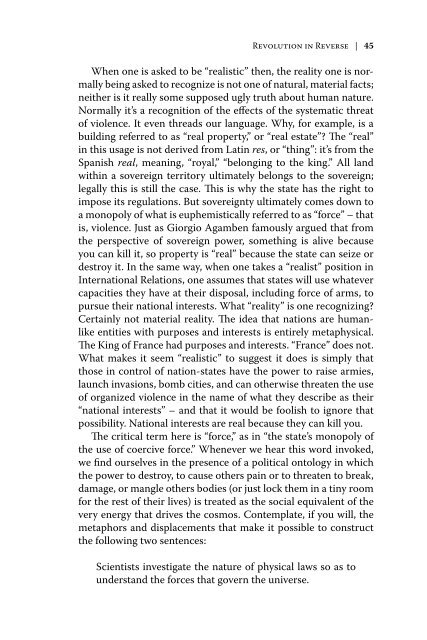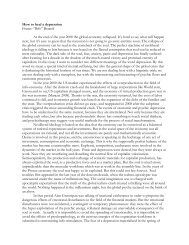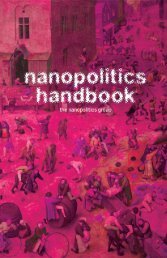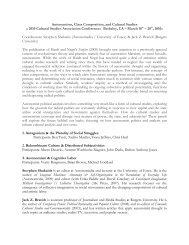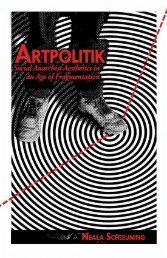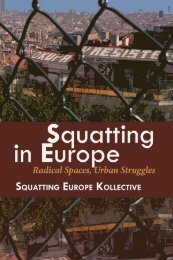Revolutions in Reverse - Minor Compositions
Revolutions in Reverse - Minor Compositions
Revolutions in Reverse - Minor Compositions
Create successful ePaper yourself
Turn your PDF publications into a flip-book with our unique Google optimized e-Paper software.
Revolution <strong>in</strong> <strong>Reverse</strong> | 45When one is asked to be “realistic” then, the reality one is normallybe<strong>in</strong>g asked to recognize is not one of natural, material facts;neither is it really some supposed ugly truth about human nature.Normally it’s a recognition of the effects of the systematic threatof violence. It even threads our language. Why, for example, is abuild<strong>in</strong>g referred to as “real property,” or “real estate”? The “real”<strong>in</strong> this usage is not derived from Lat<strong>in</strong> res, or “th<strong>in</strong>g”: it’s from theSpanish real, mean<strong>in</strong>g, “royal,” “belong<strong>in</strong>g to the k<strong>in</strong>g.” All landwith<strong>in</strong> a sovereign territory ultimately belongs to the sovereign;legally this is still the case. This is why the state has the right toimpose its regulations. But sovereignty ultimately comes down toa monopoly of what is euphemistically referred to as “force” – thatis, violence. Just as Giorgio Agamben famously argued that fromthe perspective of sovereign power, someth<strong>in</strong>g is alive becauseyou can kill it, so property is “real” because the state can seize ordestroy it. In the same way, when one takes a “realist” position <strong>in</strong>International Relations, one assumes that states will use whatevercapacities they have at their disposal, <strong>in</strong>clud<strong>in</strong>g force of arms, topursue their national <strong>in</strong>terests. What “reality” is one recogniz<strong>in</strong>g?Certa<strong>in</strong>ly not material reality. The idea that nations are humanlikeentities with purposes and <strong>in</strong>terests is entirely metaphysical.The K<strong>in</strong>g of France had purposes and <strong>in</strong>terests. “France” does not.What makes it seem “realistic” to suggest it does is simply thatthose <strong>in</strong> control of nation-states have the power to raise armies,launch <strong>in</strong>vasions, bomb cities, and can otherwise threaten the useof organized violence <strong>in</strong> the name of what they describe as their“national <strong>in</strong>terests” – and that it would be foolish to ignore thatpossibility. National <strong>in</strong>terests are real because they can kill you.The critical term here is “force,” as <strong>in</strong> “the state’s monopoly ofthe use of coercive force.” Whenever we hear this word <strong>in</strong>voked,we f<strong>in</strong>d ourselves <strong>in</strong> the presence of a political ontology <strong>in</strong> whichthe power to destroy, to cause others pa<strong>in</strong> or to threaten to break,damage, or mangle others bodies (or just lock them <strong>in</strong> a t<strong>in</strong>y roomfor the rest of their lives) is treated as the social equivalent of thevery energy that drives the cosmos. Contemplate, if you will, themetaphors and displacements that make it possible to constructthe follow<strong>in</strong>g two sentences:Scientists <strong>in</strong>vestigate the nature of physical laws so as tounderstand the forces that govern the universe.


